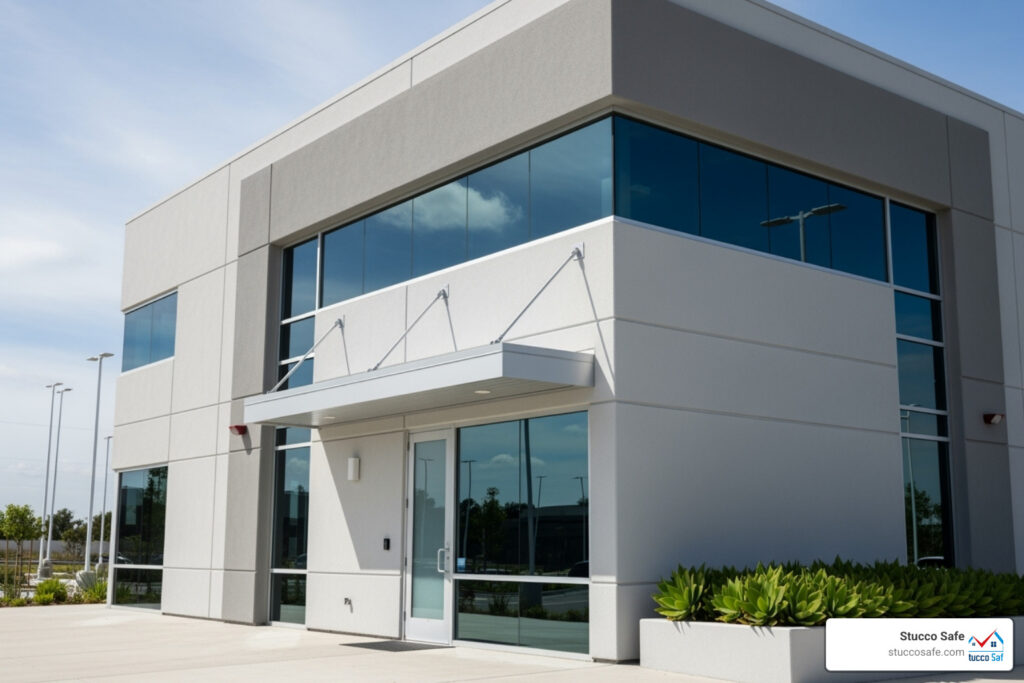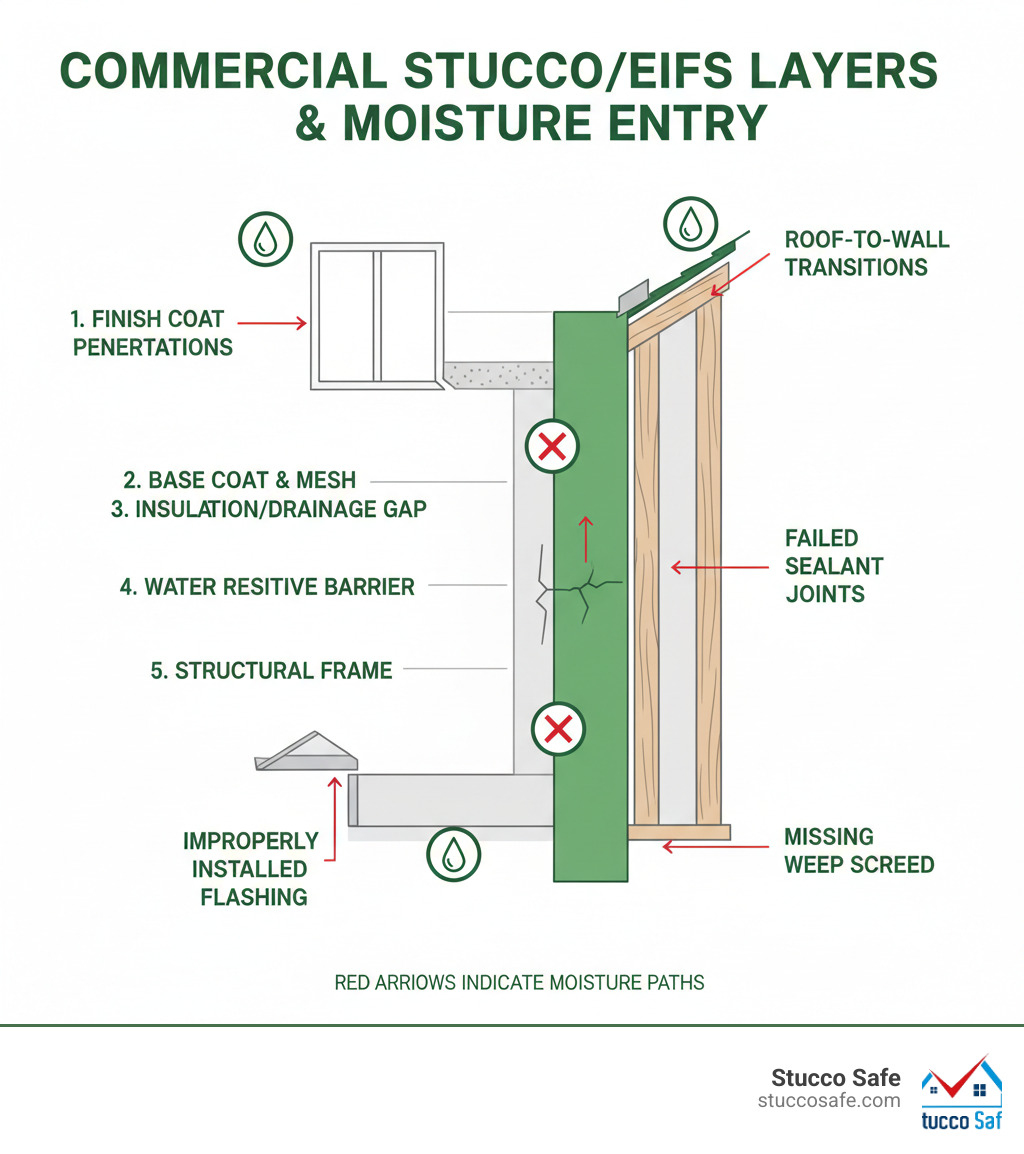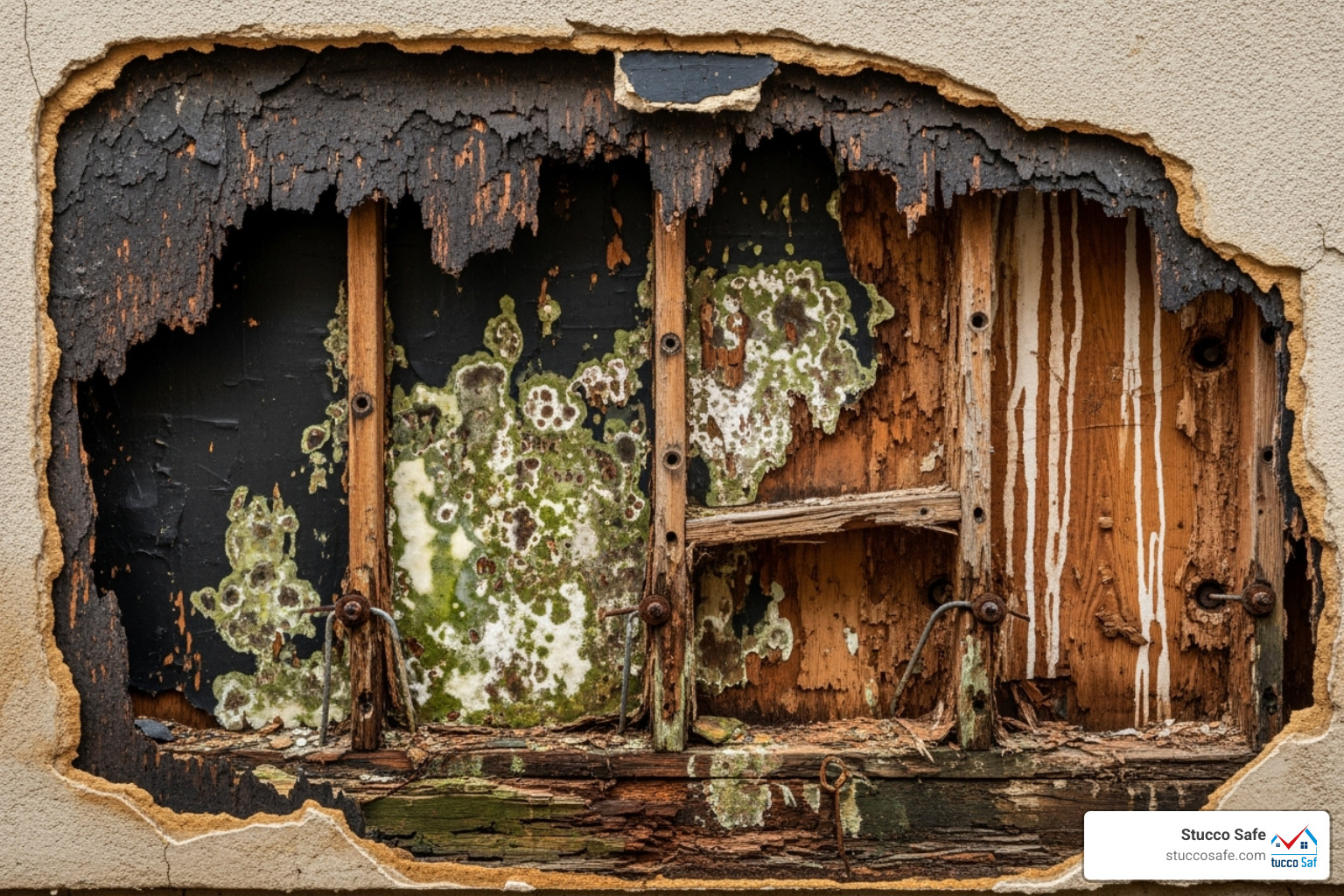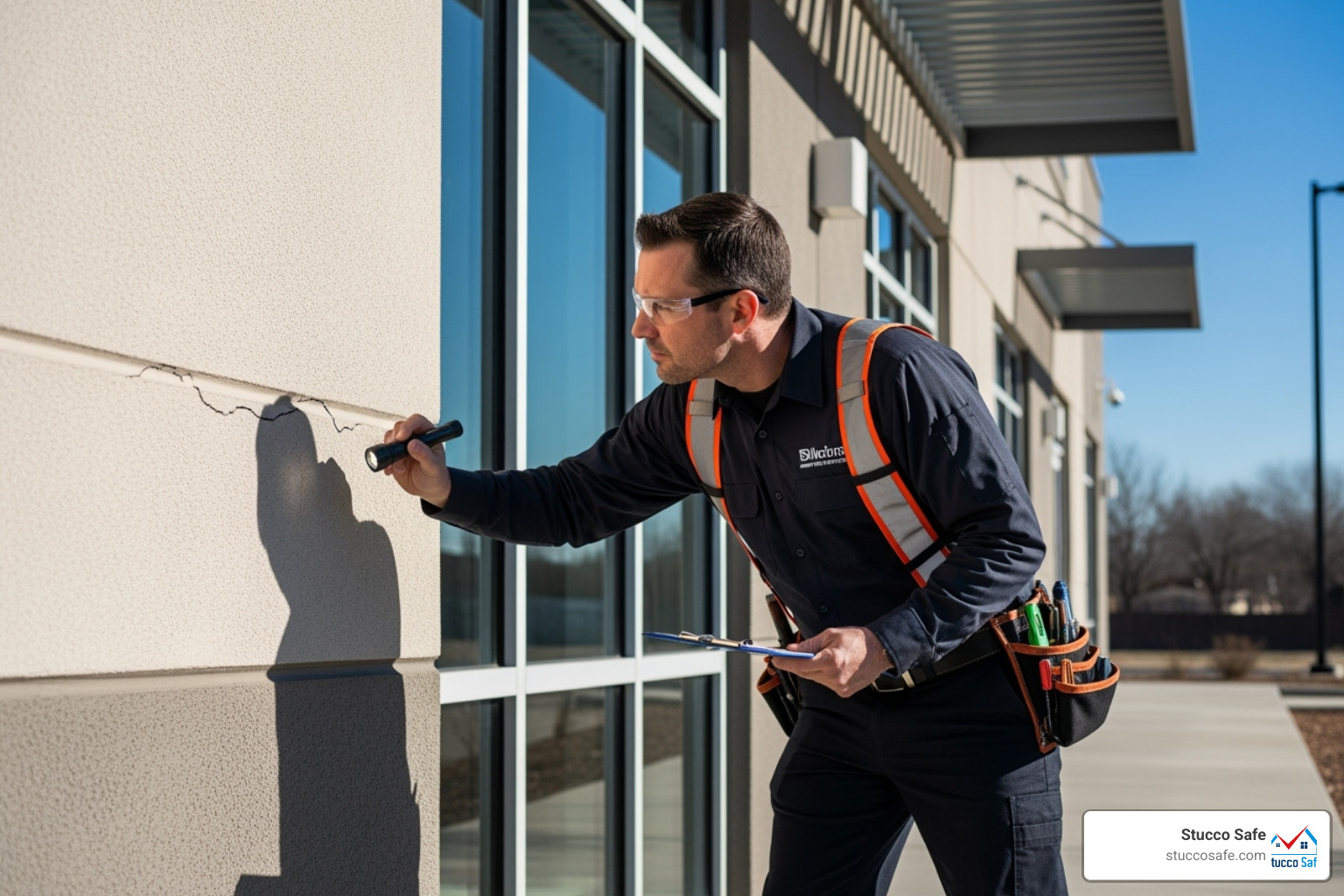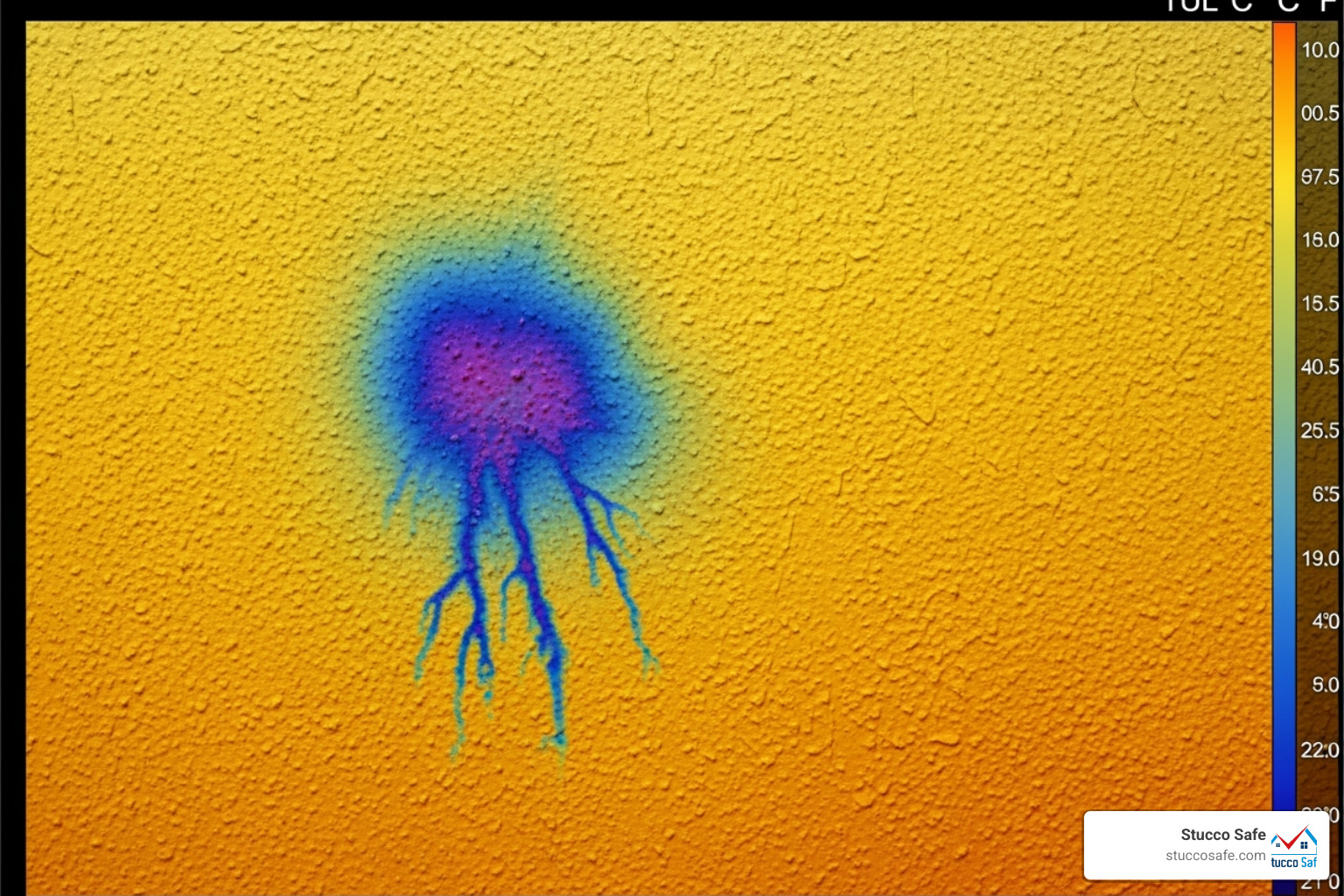Commercial Stucco Inspections NJ 2025: Secure Assets
The Hidden Risks of Commercial Stucco in the Garden State
Commercial stucco inspections NJ are essential for protecting your investment from devastating moisture damage and structural failure. Here’s a quick overview:
- Inspection Process: Visual assessment → Thermal imaging → Invasive moisture testing
- Cost Range: $495 to $1,595+ depending on building size
- Key Focus: Identifying hidden moisture behind stucco systems
New Jersey’s commercial stucco landscape presents unique challenges. It’s estimated that more than 90% of all stucco applications in the Northeastern United States, within the past 15 to 20 years, are improperly installed. This is alarming when you consider that repairs can cost from $5,000 to over $100,000.
The stakes are high for commercial properties due to larger wall areas, multiple penetrations, and the potential for business disruption. New Jersey’s freeze-thaw cycles and coastal weather create a perfect storm for moisture intrusion, especially in buildings from 1993-2006, which have failure rates as high as 90%.
The biggest challenge is that stucco failures are often invisible. Moisture can cause extensive structural damage, wood rot, and mold while the exterior looks fine. By the time you see stains or dampness, the damage is often catastrophic.
I’m Gabe Kesslick, an EDI Level 2 Certified Stucco Inspector specializing in building envelope forensics since 2001. I’ve performed countless commercial stucco inspections NJ and have seen how proactive inspections save property owners hundreds of thousands in remediation costs.
Why Commercial Stucco in NJ Presents Unique Challenges
Commercial buildings are a different beast than residential properties when it comes to stucco. The sheer scale of commercial structures—shopping centers, office buildings, industrial complexes—means more surface area and more potential failure points.
Complex architectural designs with decorative elements and multiple roof lines create numerous areas where water can get trapped. Commercial buildings are also riddled with penetrations for HVAC, utilities, and signage, each one a potential leak point if not perfectly sealed.
New Jersey’s freeze-thaw cycles are particularly brutal. Trapped moisture freezes and expands, cracking the stucco and accelerating deterioration. This is especially true for buildings constructed between 1993 and 2006, which have failure rates as high as 90% due to building code issues from that era. For a commercial property, a major failure means business disruption, lost revenue, and potential closure.
Key Differences: Commercial vs. Residential Stucco Inspections
- Scale and Access: Commercial properties are larger and often require lifts or scaffolding, making inspections more complex and time-consuming than residential jobs.
- System Diversity: A single commercial building may have multiple stucco systems (e.g., traditional hard-coat and EIFS), each with unique failure modes.
- Liability: Repair costs and potential business interruption losses are exponentially higher, increasing liability.
- Tenant Impact: Inspections must be coordinated to minimize disruption to business operations.
- Structure: Commercial buildings often use steel framing, which changes how moisture moves and damage manifests compared to wood-framed residential homes.
Common Commercial Stucco Systems and Their Failure Points
You’ll typically find two main systems in New Jersey:
- Traditional Hard-Coat Stucco: A cement-based system applied over metal lath. It’s more forgiving but not immune to moisture issues.
- EIFS (Exterior Insulation and Finish System): A synthetic system popular for its smooth look. It’s highly problematic if water gets behind it, as it traps moisture like a sponge.
The most common failure points we find are improperly installed flashing around windows and roof transitions, missing weep screeds that prevent drainage, and failed sealant joints around penetrations.
Moisture Intrusion and Its Consequences on Commercial Properties
When moisture gets behind commercial stucco, it leads to a cascade of expensive problems:
- Structural Rot: Moisture silently destroys wood sheathing and framing, requiring costly structural repairs.
- Mold Growth: Creates health risks for employees and customers, leading to potential lawsuits and business closures for remediation.
- Business Interruption: Scaffolding, noise, and closures during repairs result in significant lost revenue.
- Decreased Property Value: A history of stucco problems stigmatizes a building, reducing its market value and making it harder to sell.
- Insurance Difficulties: Many policies exclude certain types of water damage, making claims difficult without proper inspection records.
Repair costs for commercial stucco issues typically range from $5,000 to over $100,000. It’s always cheaper to address a problem early, which is why commercial stucco inspections NJ are a critical investment.
The Anatomy of a Comprehensive Commercial Stucco Inspection
A true forensic evaluation goes far beyond a simple visual check, as most stucco problems are invisible from the outside. At Stucco Safe, we use a systematic, three-phase process to uncover hidden issues.
Step 1: The Initial Visual Assessment
Our certified inspectors conduct a methodical examination of the entire stucco exterior, looking for subtle warning signs:
- Cracks and Staining: Even hairline cracks can allow significant water intrusion. Dark stains often indicate long-term water flow behind the stucco.
- Bulging or Delamination: Stucco pulling away from the wall is a clear sign that moisture has compromised the system.
- Efflorescence: White, chalky deposits left behind as water evaporates from the wall surface.
- Improper Ground Clearance: Stucco should be at least 6-8 inches from the ground to prevent it from wicking up moisture.
- Failed Sealants: Cracked or missing caulk around windows, doors, and other penetrations are open doors for water.
- Flashing Details: We inspect the critical metal components designed to direct water away from vulnerable areas like roof-to-wall connections.
Step 2: Advanced Non-Invasive Technology
After the visual assessment, we use high-tech tools to see inside your walls without causing damage.
- Thermal Imaging: Infrared cameras detect temperature differences on the wall surface. Trapped moisture often appears as cooler spots, guiding us to problem areas.
- Electronic Surface Moisture Scanning: These scanners use radio frequencies to detect liftd moisture levels in the outer layers of the stucco, helping us map the extent of surface moisture.
These non-invasive methods create a roadmap of potential issues, but they don’t provide definitive proof of damage. For that, we move to the final step.
Step 3: Forensic and Invasive Testing for commercial stucco inspections NJ
This is where we get definitive answers.
- Moisture Probe Testing: This is the gold standard. We drill tiny, inconspicuous holes (3/16th of an inch) at strategic locations and insert specialized moisture probes. These instruments give us precise moisture readings of the substrate behind the stucco, confirming the presence and severity of a problem.
- Substrate Integrity Testing: We use resistance probes to determine if wood rot or other structural damage has already occurred.
As members of the Exterior Design Institute (EDI #NJ-89) and with Level 1 Thermography certification from Infraspection Institute, we adhere to the highest industry standards. After testing, we seal all probe holes with color-matching caulk, leaving no trace. This three-phase approach gives you a complete and accurate picture of your building’s condition.
Decoding the Inspection: Reports, Qualifications, and Next Steps
Choosing the right expert and understanding their findings is crucial for protecting your investment.
What a Comprehensive Commercial Stucco Inspection Report Includes
Our reports are detailed forensic analyses that serve as your roadmap for action. They include:
- Executive Summary: The most critical findings and urgent recommendations upfront.
- Detailed Photographic Evidence: High-resolution, annotated images documenting all issues.
- Annotated Diagrams: Marked-up floor plans or elevations showing the exact location of problems.
- Moisture Level Readings: Hard data from our probe tests quantifying the severity of moisture intrusion.
- Substrate Condition Analysis: An assessment of any hidden structural rot or deterioration.
- Prioritized Repair Recommendations: A clear guide on what needs immediate attention versus what can be addressed during planned maintenance.
- Actionable Next Steps: Guidance on consulting with contractors and using our findings to get accurate repair quotes.
Essential Qualifications for a NJ Commercial Stucco Inspector
Not all inspectors are created equal. For commercial properties, you need specialized expertise. Look for:
- EDI Certification: The gold standard from the Exterior Design Institute, signifying specialized training in stucco and EIFS.
- Certified Moisture Analyst: Expertise in how moisture moves within building envelopes.
- Level 1 Thermographer: Certified to properly operate and interpret thermal imaging cameras.
- Commercial-Scale Experience: Proven experience with the unique logistics, safety, and construction of large commercial buildings.
- Unbiased Reporting: We don’t sell repair services, so our analysis is completely objective. Our goal is to give you the truth, not a sales pitch.
After the Inspection: Planning for Remediation
Your report is the first step. Use it to:
- Prioritize Repairs: Address urgent issues like active leaks first, and plan for less critical maintenance.
- Obtain Quotes: Share our technical findings with qualified contractors to get accurate, comparable bids.
- Understand the Scope: We are available to discuss our findings with your chosen contractors to ensure they fully understand the necessary repairs.
- Prevent Future Issues: Our report includes recommendations for ongoing maintenance to protect your investment long-term.
The ROI of Proactive Inspections: Protecting Your NJ Commercial Asset
Regular commercial stucco inspections NJ are not an expense; they are a strategic investment that protects your property and your bottom line.
How Regular Inspections Prevent Catastrophic Repair Costs
The numbers don’t lie: ignoring stucco problems causes costs to escalate exponentially.
- Early Detection Saves Money: Catching minor flashing issues or small areas of moisture can turn a potential $100,000+ nightmare into a manageable, targeted repair costing a few thousand dollars.
- Minor vs. Major Repairs: The difference is timing. Recaulking a joint is a small maintenance task. Replacing rotted structural wood and remediating mold is a major, costly project.
- Prevent Structural Failure: Early detection prevents the progressive decay of your building’s structural components, avoiding immense repair costs and safety hazards.
- Avoid Mold Infestations: Mold remediation in commercial settings is expensive and complex, with potential health and legal ramifications that multiply costs.
- Budget for Maintenance: Regular inspections allow you to plan and budget for necessary repairs, avoiding financial emergencies.
Maintaining Property Value and Insurability
Proactive inspections also preserve and improve your property’s value.
- Protect Your Investment: A sound building envelope protects your asset from the silent depreciation caused by hidden damage.
- Improve Marketability: A clean inspection report is a major selling point for potential buyers or tenants. Properties with stucco certification often sell faster and for higher prices.
- Satisfy Lenders and Insurers: A professional report can satisfy due diligence requirements, facilitate financing, and improve insurance terms.
- Avoid Transaction Delays: Finding stucco issues during due diligence can derail a sale. A pre-emptive inspection smooths the process.
- Reduce Liability: Proactively addressing issues reduces your exposure to claims related to structural damage or mold.
Frequently Asked Questions about commercial stucco inspections NJ
Here are answers to the most common questions we receive from commercial property owners.
How often should a commercial property’s stucco be inspected?
If your property has never had a professional stucco inspection, schedule one immediately, especially if it was built between 1993 and 2006, an era with notoriously high failure rates. For properties with a clean bill of health, we recommend a comprehensive inspection every 5-7 years as part of a proactive maintenance plan. An inspection is also critical during any pre-purchase due diligence and after severe weather events.
How long does a commercial stucco inspection take?
The duration depends on the building’s size, complexity, and accessibility. A small commercial space might take half a day, while a large complex could require multiple days. The use of lifts or scaffolding also adds time. We provide an estimate upfront, but a thorough process is never rushed.
Can a failed stucco system on a commercial building be repaired?
Yes, in most cases, a failed stucco system can be repaired. The scope of the repair depends on our inspection findings. Minor issues might involve targeted fixes like replacing flashing or resealing joints. More extensive damage may require removing sections of stucco and addressing underlying rot. Our detailed report provides a clear roadmap for contractors, ensuring you get accurate quotes for the necessary work. The key is to catch problems early before they escalate into a major remediation project.
Conclusion: Secure Your Investment with an Expert Inspection
The risks of improperly installed stucco in New Jersey are too significant to ignore. With over 90% of applications being faulty and repairs easily exceeding $100,000, proactive commercial stucco inspections NJ are essential protection for your investment.
Ignoring potential issues can lead to structural damage, mold infestations, business shutdowns, and decreased property values. A comprehensive inspection from a certified professional is the only way to know for sure what’s happening behind your walls.
At Stucco Safe, we provide forensic precision and unbiased reporting. As EDI Level 2 Certified inspectors, we use advanced technology to uncover hidden problems. Because we don’t perform repairs, you can trust our findings are objective and in your best interest.
We serve commercial property owners throughout New Jersey, including Newark, Jersey City, Cherry Hill, Edison, Paterson, Elizabeth, and Trenton. The cost of an inspection, typically $495 to $1,595+, is minor compared to the potential cost of undetected damage. It provides invaluable peace of mind.
Don’t wait for visible signs of trouble. By then, the damage is already done. Schedule your expert stucco inspection in New Jersey today and take the first step toward securing your commercial property’s future.

